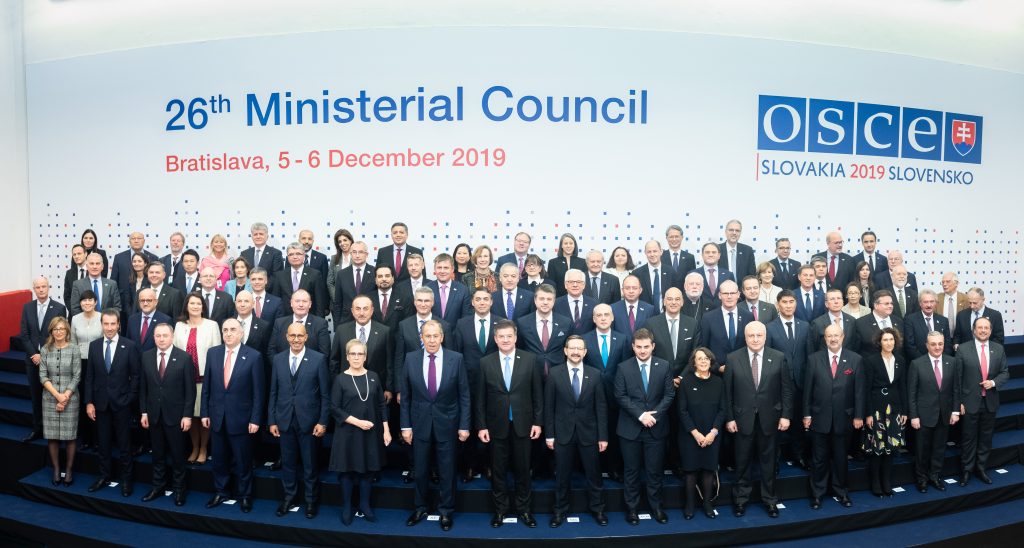Foreign Ministers and senior diplomats of several participating states of the Organization for Security and Cooperation in Europe (OSCE) made statements on Georgia in their addresses at the 26th Ministerial Council in Bratislava, Slovakia on December 5.
Below are the Georgia-related excerpts from their statements as delivered:
Estonia, Foreign Minister Urmas Reinsalu: “The ongoing crisis in and around Ukraine and Georgia, eleven years since the beginning of Russian aggression in Georgia and five years in Ukraine, all oversee participating states have agreed to abide by common principles and commitments starting from the Helsinki final act. Yet, this has not been the reality and we have seen both breaches in the international law and violations of sovereignty and territorial integrity of Georgia and Ukraine. We’re deeply concerned about increasingly deterrent security and humanitarian, human rights situation in the occupied regions due to Russia’s illegal and destabilizing actions.”
European Union High Representative/Vice-President Josep Borrell: “Conflict in our area whether in Georgia, Moldova or Nagorno-Karabakh, should be solved only in line with the OSCE principles.”
Finland, Deputy Foreign Minister Matti Anttonen: “We must continue to work towards the solution of protracted conflicts in the OSCE area – the Republic of Moldova in Georgia and in Nagorno-Karabakh. This is the core mandate of the OSCE. Recently we have witnessed deterioration of the security situation along the administrative boundary line with South Ossetia region of Georgia. We urge all relevant actors to refrain from actions that could escalate the situation. We call on Russia to fulfill its obligation under the EU mediated ceasefire agreement of 12 of August 2008.”
Latvia, Foreign Minister Edgars Rinkēvičs: “We very much talk about the… security environment in Europe, to build a new security architecture, but it is impossible if we do not correct what is wrong today like the territorial integrity of Ukraine, Moldova, Georgia, the resolution of Nagorno-Karabakh conflict. If we don’t address those things, it is very optimistic and, actually, impossible to speak about the need to build something new.”
Norway, Foreign Minister Ine Eriksen Søreide: “There are also other unresolved conflicts in Moldova and Nagorno-Karabakh, where OSCE plays a role. In Georgia, OSCE could play an even bigger role if we – the participating states – allow for it.”
OSCE Chairperson-in-Office and Minister of Foreign and European Affairs of the Slovak Republic, Miroslav Lajčák: In Georgia people are living with reality of frequent denials of fundamental freedoms, like the freedom of movement.
OSCE Parliamentary Assembly President, Giorgi Tsereteli: I see here [Russian Foreign] Minister [Sergey] Lavrov and I hope that this will also extend to implementation of commitments and obligations Russia has undertaken. For instance, in Georgia, where the situation in occupied Akhalgori district could easily develop into human catastrophe if ‘borderization,’ blockades and incidents like the arrest of famous physician [Vazha] Gaprindashvili continue.
Poland, Foreign Minister Jacek Czaputowicz: We are still challenged with the protracted conflicts in Georgia, Moldova and the Nagorno-Karabakh conflict. They all need to be resolved in line with the OSCE principles. The OSCE has a unique set of mechanisms for effective mediation and dialogue facilitation in these conflicts.
Romania, Foreign Minister Bogdan Aurescu: Let me also reaffirm Romania’s strong support for the sovereignty and territorial integrity of Georgia within its internationally recognized borders. We strongly condemn any attempt to prevent the EUMM to pursue its work and fulfill its mandate.
Sweden, Foreign Minister Ann Linde: The protracted conflicts in other parts of OSCE area – in Georgia, Moldova and Nagorno-Karabakh conflict – need to be resolved in line with OSCE principles.
Turkey, Foreign Minister Mevlüt Çavuşoğlu: We are faced with numerous challenges in the OSCE region… frozen conflicts in Georgia, Transnistria, and the Karabakh and the occupied territories of Azerbaijan remain unresolved. We need to find solutions in accordance with the international law and on the basis of territorial integrity.
Ukraine, Foreign Minister Vadym Prystaiko: In few days in Paris in the Normandy Four summit, we will try to achieve progress in resolving the biggest acting conflict in Europe. We hope, that progress on this track could pace the way to peaceful resolution of protracted conflicts not just in Ukraine, but in territories of Georgia, Moldova and Republic of Azerbaijan with full respect for their sovereignty and territorial integrity within internationally recognized borders.
The United States, Acting Assistant Secretary of State for European and Eurasian Affairs Philip Reeker: Russia continues its military deployments in Transnistria and the occupied regions of Georgia without the consent of the Moldovan or Georgian governments. We need to do more as a community to identify avenues to peace in those countries and in the broader region.
Representatives of Bosnia and Herzegovina, Cyprus, Denmark, Iceland, Lithuania, Portugal, and the United Kingdom, also expressed their support for Georgia.
Read also:
This post is also available in: ქართული (Georgian) Русский (Russian)

